
Read our 2024 annual report

Knowledge Hub
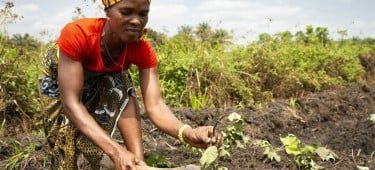
Food and Nutrition Security through Equitable and Climate Smart Food Systems (Yoti Yoti)
Overview
Sierra Leone is among the least developed countries in the world (ranked 184 out of 193 countries on the Human Development Index) and is continuing to struggle with a highly fragile economy.
Although consumer inflation has decreased in the last 2 years at 28.6% it remains one of the highest globally. The Cadre Harmonisé analysis showed annual food inflation rate reached 45% in February 2024, leading to substantial increases in staple food prices including; local (Increase of 33%), imported rice (Increase of 38%), and cassava (increase of 122%) leaving up to 82% of the population were food insecure, with 18% facing severe food insecurity according to the World Food Programme (WFP).
Although many challenges still exist, the 2025 Global Hunger Index continues to show some improvement in the overall trend in all categories measured with the exception of 24.1% of the population who are undernourished showing that with support to strong and inclusive policies which build stronger systems there can be success in the future.
Sierra Leone Context
of the population is undernourished
of children under five are stunted
of children die before their fifth birthday
Programme Description
Yoti Yoti is a €6 million five-year project funded by Irish Aid under the ‘Ireland’s Civil Society Partnership for A Better World’ (ICSP) 2023-2027. It aims to strengthen food systems in 108 communities of Tonkolili and Port Loko Districts in Northwest Sierra Leone.
To increase vulnerable households’ resilience to food and nutrition insecurity, the programme adopts an integrated food system for food security approach, bringing together the four food security pillars. Each of these pillars do not stand alone; they interact with each other at micro, meso and macro levels, with gender equity and inclusion and climate adaptation and environment underpinning them all.
Availability
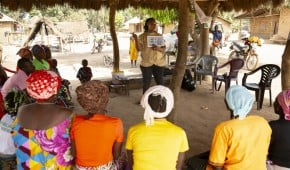
Enough food is produced and physically present and accessible in the communities on a consistent basis. It includes food from domestic production (crops, livestock and agroforestry grown or raised locally) as well as gathered from wild trees and fishing.

Access
Utilization
Stability
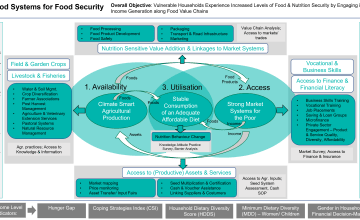
Partnerships
Miro Forestry & Timber Products
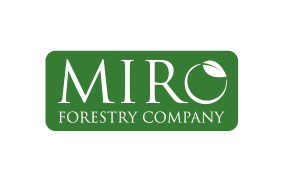
Miro is a private sector and forestry company operating in Sierra Leone since 2011, focused on developing high-quality commercial timber plantations and producing sustainable wood products including plywood, poles, and treated timber for local and export markets. It provides local employment, and invest in community development projects, including education and access to clean water. Since their establishment, they have also planted over 20 million trees sequestering millions of tonnes of atmospheric CO2.
The Yoti Yoti programme is leveraging Miro's skills to pilot agro forestry and out grower schemes in 3 communities in Tonkolili.

Water, Sanitation and Hygiene Network (WASH-Net )
Community Integrated Development Association (CIDA-SL)
Action for Advocacy and Development (AAD-SL)
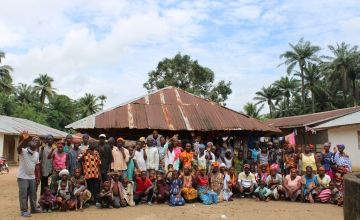
Expected outcomes
Increased inclusive climate smart food production (availability).
Stronger access to markets for those living in conditions of extreme poverty (access).
Stable consumption of an adequate and affordable diet by all (utilization).
Evidence generated is used to influence at district and national level (stability).
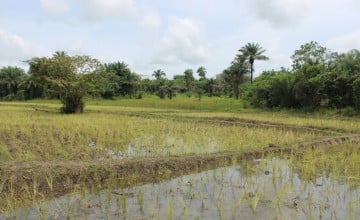
Key Activities
1. Increased inclusive climate smart food production (availability)
- Following a Climate Vulnerability and Capacity Analysis (CVCA), the programme is piloting solar powered irrigation in 2 communities, sufficient for irrigating a 3 acre piece of land per day for rice cultivation, managed by a Community Water Management Committee in each location who have been trained to manage these facilities.
- Concern is supporting the Ministry of Agriculture and Food Security (MAFS) to hold animal vaccination campaigns (goats and sheep) alongside training for lead farmers to strengthen networking and linkages among farmers, fostering knowledge exchange and experience sharing to boost agricultural production. For example, the 2025 training, focused on basic agronomic practices for Inland Valley Swamp (IVS), vegetable production, compost making and livestock management practices.
- Farmer Field Schools have been supported to implement improved agricultural practices through demonstrations, peer learning, and technical support. The participants also received farm inputs including haematic sealed containers to reduce post-harvest losses, farm tools, vegetable seeds including seed rice, cassava stems and potato vines.
- The 2024 annual survey has shown an increase in the number of different agricultural produce produced by the household over the past year from 2.8 at baseline to 4.76 at year 2 (against a target of 3.36).
2. Stronger access to markets for those living in conditions of extreme poverty (access)
- A market assessment report showed 6 value chains are prioritized in the 2 districts; rice, cassava, groundnuts, sweet potato, vegetables and poultry.
- To enable sustainable and inclusive access to and understanding of markets, farmers and value chain actors, (transporters, retailers, wholesalers, millers, processors, traders, fish mongers, and private sector agencies), were brought together to interact, identify and find solutions to barriers. For example, a ledger of contacts has been compiled allowing sellers to link with transporters and buyers when it is most profitable to market their produce.
- Timely data on market trends, pricing, demand, and supply, is provided to farmers allowing them to better plan their production, reduce post-harvest losses, and maximize profits. Access to such information fosters stronger market linkages, enhances bargaining power, and promotes sustainable livelihoods, which eventually will lead to more effective local and regional markets.
- The '17 rules of Business' skills training was conducted for trainers and programme participants who are now cascading this to other community members. Refresher training focusing on entrepreneurial skills, including financial literacy and record-keeping, is also enhancing the capacity of Village Savings and Loans Association (VSLA) animators and community training facilitators.
- These interventions have supported participants to increase the percentage of their market income from selling their food produce from 0 at baseline to 31% in 2024 (against a target of 25%).
3. Stable consumption of an adequate and affordable diet by all (utilization)
- Community Animators have been trained on 'Knowing Your Food' and 'Maternal and Child Nutrition' before carrying out sessions in the communities alongside cooking demonstrations to reinforce key lessons on nutrition and healthy food preparation using locally available ingredients.
- A nutrition campaign has been conducted through local radio stations to raise awareness on appropriate nutrition practices, targeting both urban and rural populations. The radio broadcasts featured interactive segments, including expert interviews from the District Nutritionist, call-ins, and culturally appropriate jingles. The Minimum Dietary Diversity for Women (MDD-W) has increased from 34% in 2023 to 48% in 2024 (against a target of 40%) and the Child Minimum Dietary Diversity increased from 15% in 2023 to 29.4% in 2024 (against a target of 20%).
- Concern is supporting the rehabilitation and construction of hand-dug wells and the drilling of boreholes in collaboration with our partner, WASH-net.
4. Evidence generated is used to influence at district and national level (stability)
- Concern and its partners organised a national launch of the Yoti Yoti programme in 2023, raising visibility and highlighting the impact that it is making to food security in Sierra Leone and its alignment to Feed Salone.
- We continue to be part of Food and Nutrition Security working groups both at District and national levels - a key area of focus is ensuring the voices of small holder farmers, (including women and adolescents) are heard and can influence Government policies and strategies.
- Concern is supporting the Cadre Harmonise convergence of evidence meeting conducted by MAFS (a regional framework aimed to prevent food crisis by quickly identifying affected populations and proffering appropriate measures to improve their food and nutrition security situation).
- Supporting activities related to International Women’s Day and 16 Days of Activism, as well as contributing to International Breast-Feeding week and World Food day.
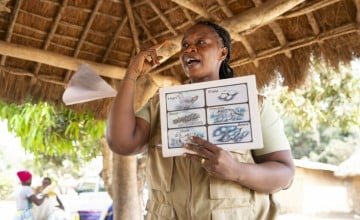
Emerging Lessons
- Farmers are experiencing significant increases in yield through the System of Rice Intensification (SRI) and Farmer Field Schools, while inclusive participation and locally adapted, sustainable practices are improving harvests, reducing costs, and strengthening community cohesion
- By fostering dialogue among value chain actors and sharing market prices through local radio, the project empowered smallholder farmers to overcome market barriers. VSLA's are restoring financial dignity, improving livelihoods, and enabling agricultural investment.
- Combining nutrition education with traditional foods is leading to healthier diets, accompanied by LANN modules promoting positive behaviour change, practical cooking skills, and reducing food waste, although affordability remains a challenge, underscoring the need for continued livelihood support.
- Although no direct policy shifts have yet occurred, Yoti Yoti is generatating valuable evidence and visibility that could inform future advocacy for livelihood programming both at the district and national levels. In addition, despite being developed before the Government's Feed Salone Strategy, Yoti Yoti sits strongly in alignment, demonstrating benefits of close government collaboration.
- Regular knowledge exchange and shared experiences between Concern and its partners is strengthening mutual understanding, fostering innovation, and building trust, creating the foundation for long-term collaboration.
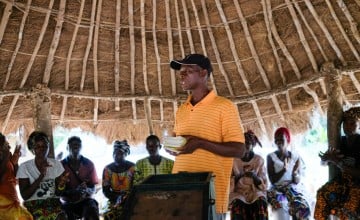
Testimonials
- Restoring Harmony
Before Yoti Yoti, conflict was constantly presence in Fatmata and Hassan's home. Hassan believed that he had absolute control over the household . Their home was filled with discord, fuelled by unilateral decisions and financial instability; a cycle that seemed impossible to break.
Following 11 weeks of Living Peace sessions, the couple sat with other couples, listening, learning, and reflecting on their actions and relationships. Through open discussions and role-playing exercises, Hassan began to understand the importance of consulting his wife in household decisions. He learned to manage his anger and seek alternative ways to deal with financial stress rather than resorting to violence. Fatmata, on the other hand, found her voice. She learned effective communication skills and how to express her thoughts and feelings in a way that fostered understanding rather than conflict. As they practiced what they learned, their relationship transformed and they are now role models in their community.
- Transforming Agriculture
In Makassie, a village where agriculture is the backbone of livelihoods, traditional farming methods often yielded poor harvests, leaving farmers struggling to feed their families.
Facilitated by the Agriculture and Natural Resource Management (NRM) team, the Farmer Field School Initiative was introduced. 30 farmers per group to learn basic and improved agronomic practices. The training focuses on methods that enhance soil fertility, pest control, and sustainable farming, with an emphasis on the System of Rice Intensification (SRI), a technique that significantly boosts rice yields.
Santigie, one of the Farmer Field School members in Makassie, reflected on the impact of this training. “Initially, when we planted 2 bushels (100 kg) of rice, we harvested only 4 bushels but with the new knowledge we have acquired, especially through the SRI method, things have changed. This year, as a group, we planted 12.5 kg of rice and harvested 17 bushels, which is equivalent to 765 kg.”
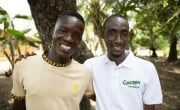


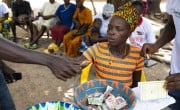
- Restoring Dignity Through Livestock
In Rolal, Yusif once struggled to maintain his standing among his peers. As a father to 3 boys and 2 girls and the primary provider for his family, he faced economic hardship, often feeling powerless against financial instability. However, when he became an active member of his community's VSLA formed by CIDA through Yoti Yoti, he began to diligently save and invest his shares.
As a result, Yusif accumulated enough funds to take a small loan from his savings. With knowledge gained from business skills training, he used the money to purchase livestock, a decision that would change his life. With his newly acquired animals, he constructed a well-built pen for his livestock, ensuring they were properly housed and protected.
Yoti Yoti also provides support to the Ministry of Agriculture and Food Security (MAFS) to conduct animal vaccination within the chiefdom. According to Yusif, "I now have the confidence to go to the MAFS office in Port Loko if I need to vaccinate my animals again because Concern has already linked us with them."
As his livestock has multiplied, Yusif has begun selling some of the animals at the local market, generating income, allowing him to support his family’s needs and contribute to community events. More importantly, Yusif has not only improved his livelihood but also restored the respect and dignity he thought he had lost.
- Access to safe drinking water
For years, the Makassie community grappled with challenge of access to clean water. With no nearby water source, women and children spent hours each day walking miles to a stream to fetch water for their families. Therefore, the community was selected as part of Yoti Yoti for the construction of a borehole, constructed by skilled engineers and youth from the community.
“We are no longer burdened by long journeys to fetch water, girls and women had more time to pursue education and economic opportunities and children can now attend school regularly. Health has improved with less waterborne illnesses as we are drinking cleaner water” explained community member, Mahawa. The well has since become a focal point for gatherings, fostering a sense of unity and belonging.
Partner Organisations
Action for Advocacy and Development Sierra Leone (AAD-SL)
Community Integrated Development Association (CIDA)
Miro Forestry
WASH-Net










